We close our door and step into the hall way – darkness. Fumbling with the key I feel for the lock and, finding, twist round and round to bring the triple deadbolt to its end. We feel our way along the wall until we locate the first step of the spiral staircase, which swirls down three floors to the street.
way – darkness. Fumbling with the key I feel for the lock and, finding, twist round and round to bring the triple deadbolt to its end. We feel our way along the wall until we locate the first step of the spiral staircase, which swirls down three floors to the street.
Stepping on to the sidewalk we take in a blast of fresh air. A new day – cool, bright, yet charged with smoke and the brash accelerations of buses and mopeds – our first, here in Tbilisi, the capital of Georgia.
I spin around, trying to get my bearings. A man in dark slacks looks up at us doubtfully as he passes. A group of young women stride by, laughing and exchanging proud smiles, giving us not a look. I turn to locate the door we came through – the greasy glass entrance to a defunct vacuum cleaner shop, otherwise boarded up, and yes, to its right, our door, a narrow wooden sleeve on bare hinges, unmarked. This will be our hotel for this one-week stay in the city. Its name, if it has one, I never came to know.
Satisfied, I turn to find my first landmark: the central plaza of north Tbilisi, Mardzhanishvili, ringed by lanes of traffic and framed by a towering multi-block apartment building stretching the length of the plaza. Painted a cheerful yellow and blue, this building was, I guessed, one of the many bulk-living arrangements built in the 1990s by the post-Soviet Georgian government to house the city’s needy and destitute. By the end of that decade, as a result of the Abkhaz/Ossetia Civil Wars, over 100,000 refugees had fled to the capital Tbilisi. This, in part, fueled the parochsisms of gang violence and street warfare that characterized the early 2000s and made Tbilisi a notoriously dangerous city. Though the situation is far better today, I find myself asking if, beneath the veneer of stability, there isn’t a larger storm brewing in Georgia’s future.
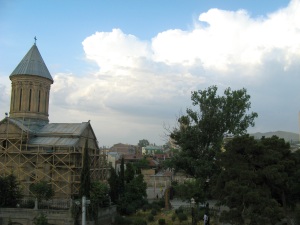
“Ready?” Will asks, urging me on. We cross the street and pass into a park. Overgrown, waist high grass encircles an old church. Men sit privately, lost amidst the overgrowth and a group of children tromp about with a rubber ball, kicking it forcefully against the church wall to see how high they can make it go.
Leaving the church grounds, we enter a dusty warren of narrow streets. The asphalt is broken, upended in nearly every place. Against the curb sits an ancient car, its bare, rusted axels half submerged in the dust and debris. Glancing down side streets I see appliances, abandoned to rust and rain, resting under the brick walls of family homes, some of which are buttressed by wood supports, anchored in the street. Plots of broken brick, heaped in mounds, separate the homes that stand.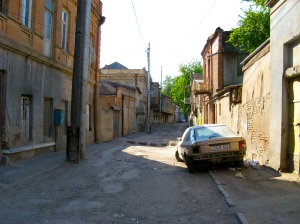
Looking about me, I’m strangely drawn to the bricks of the buildings themselves. Melting. They seem to be melting, I remark to Will. Dissolving right out from under the structure and onto the sidewalk as a cake of dusty clay. This, we would later learn, is legacy from Tbilisi’s former Soviet administrators who, in an attempt to scrape some meager personal profit from construction, made a practice of adding too little clay to the brick itself. Thus it is that some of the most characteristic buildings in Tbilisi’s older neighborhoods appear water-carved and formless, wood frames outlasting the very foundation beneath.
We step up to the sliding window of a tiny bakery shop – truly a hole-in-the-wall joint, being that the window was the only entrance – and order two portions of Katchipuri – Georgia’s staple fast food – a square of pastry dough filled with cheese, baked in butter. Across the way a group of young men linger by an open door, watching us intently.
We continue on, meal in hand, until we pass the Sameba Cathedral. Funded largely by one anonymous Russian donor, it is the largest cathedral in the Caucuses and towers 320 feet over North Tbilisi, the poorest part of the city. Today, the gold cross, high at the apex, sails far above in a hazy blue sky strung with thin cloud.
Taking in our last bite of Katchipuri we tuck the greasy wrapper into a heaped pile of refuse – to guilty in our American minds to simply throw it on the street without a public trash can – and move on.
The broken pavement turns to dirt and soon we find we can go no further. Here the road ends in a set of railroad tracks. We stop. Railroad tracks – a demarcation I’ve found in so many places – in Jordan, Iran, N. Ireland, France– to mean the end of one community and the beginning of a different, other.
The tracks stand fenced, raised atop a mound of dirt– the edge of the city. Standing in the street, we look about, eyes squinting in the sun. Beneath the tracks, I notice a dark passageway, leading under and out the other side.
Will turns to say something but his words are cut off by a black Mercedes. We both turn to watch it cruise slowly past, kicking up a cloud of dust. Across the way, a group of men stand outside a small shop, laughing in low voices. The car slows to approach them and the laughter stops. A tinted window lowers. Nods of recognition, smiles and outstretched hands. After a brief exchange, the window rises. The men wave as the car speeds away, out beyond the tracks, where my eyes linger.
Will looks down at his map, doubtful, and suggests we take a left and make our way towards downtown. Snapping from my gaze, I feel a sudden burst of conviction. No. No under the tracks! We should go out that way. I can feel his hesitation but do not stop to ask. I push off towards the tracks and Will follows my lead.
A dark concrete tunnel; walls slimed in places, black and shiny. We pass through to the other side and find there a new and different world. The road, clearly once a road, has been powdered to dust. The hollow shell of a bus stop sits amidst dry pines – a reminder of services and development promised, but never delivered. A discomfort stirs in the back of my mind but I silence it to stride on.
Lining the road are houses – really more like compounds – ramshackle multi-story abodes combining sheet metal, wood slats, logs, chain fense, bushes, anything to create a barrier. Yet most share two things with great consistency: a solid steel gate set in concrete and a fantastic complexity of welded steel-pipe, there to support the infamous Georgian grape as it weaves its way about the compound, draping the whole in a deep, puffy green.
The day has grown hot and the sun is now high. A young man stares at us from the shade of a doorframe, half submerged in the darkness of a cool living room. Up the way an old women sits under an umbrella, tapping her foot listfully as she stares into the trees above the road. Set out before her is pan of black seeds, apparently for sale to the passersby, which, at this moment, could only be us. “Gamarjobot” we offer with a smile. She mumbles the same and gives a slight nod, keeping her eyes fixed in the trees as we pass.
Coming atop a hill, Will stops to pull out his video camera. Slowly he captures a panoramic of the city, which opens its skyline fully from this vantage point. The evening before, looking through binoculars from our hotel balcony, Will and I noticed a dense forest of concrete apartment buildings clustered in the hills north of Tbilisi. The monotone structures marched back into a valley, enticing our imagination to wonder what life out there, in this other city outside the city, could be like.
Coming around a corner we found ourselves facing the first of these buildings. My eyes gazed upward; eight floors, each revealed by a ragged outline in the unfinished side of the structure. Colorful clothes hung from rust-red balconies, all facing south. A moment’s thought back to last night reminded me there were more of these buildings, many more, out beyond what we can see. A lone steel pipe snaked up the hillside, presumably bringing water to the establishment.
To my right, in the shade of the building, was an overgrown picnic table, surrounded by young men. They laughed loudly, picking fights and hitting each other with mock aggression.
Glancing at the scene, I took a breath and pressed on up the hillside. Yet after a few seconds Will and I both came to a stop – the heckles from the table to clear to ignore. Springing from the table, the group of young men strode over to confront us. Raising a hand, Will and I gave a hello in Georgian. This was returned with a slew of obscenities, some in broken English, leering smiles and testy gestures. Deciding this was not the place nor the time, I waved goodbye and pulled on Will’s arm, turning us around to go back the way we’d come.
Strange. I just wanted to walk, to amble back into the city and snap a few shots I’d missed on the way up. But within seconds, I found myself running. Running fast. Rocks, some of them very big, rained down around us and the image of a chase compelled us not to stop.
Eventually, looking back to an empty road, we slowed to a trot. Briskly we went on, passing between us startled looks, and, going by a different road, passed back under the railroad tracks.
We now walked parallel to the tracks and found ourselves passing through an old brick neighborhood at the edge of the city. Here the tracks were level with the homes and the street. This afforded us views back to the other side: in an empty field of brown grass, a vast soviet-era building, maybe a rain station, adorned with decorative cornice and molding, blackened from fire and shattered windows revealing darkness within. Further on there was an abandoned factory complex, penned in by high concrete walls. To the entrance led a road, pock-marked and overgrown. Beside heavy metal doors, stood several figures, dark in the shadows of the noonday sun. Inside the complex, men moved about a line of parked cars.
This would be our final view of the tracks and the land beyond as the road swept down into the bustle of the City. Within minutes we found ourselves crossing a car-jammed intersection at the edge of the sleepy, muddy-watered Mt’k’vari river, which separates north and south Tbilisi. Standing at the head of the intersection was a stately building, parliamentary in its style. Interested, we walked up the stone steps. There, amidst strewn rubble, a gaunt women lay; arms cut and bruised, sleeping with the needle still gripped in her hand. Will looked down at her, and then up at me. I had no idea what to say.
We stepped beyond her and passed through the entryway, its frame streaked by the smoke of uprisings a decade passed. Inside there was an elegant paneled ceiling – motifs of Soviet rulers and the formal affairs of state. Vein-patterned marble pillars extended to the floor, which was scattered with papers and trash. The smell of excrement permeated the place. We departed and passed back down the steps, casting a backward glance at the sleeping women, who remained.
Life greets us on the Saakadze bridge. Today, a lively open air market is spread out on the pedestrian side. Men in wool coats sit along the guardrail, each with a blanket spread out on the pavement, with items for sale. All manner of objects are to be found – a Playstation set, its cables neatly spooled, a pair of used latex gloves, slightly shriveled, a collection of electrical fuses, faded beige and arrayed in a neat line, an eyelash press, a sponge, a disk sander, non-electric and an abundance of one perplexing item– a metal spring mounted on a short wooden dowel. As I passed, an older man peered up at me from under a tight wool cap, pulled low. I looked passed his work-weathered hands to his blanket offerings; amongst them, an old dress-belt, whose leather ended 4 inches from the buckle.
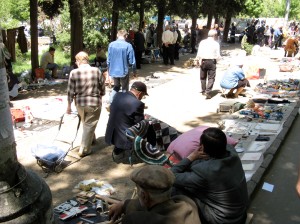 After an innocent shopper’s peruse, I stop. This is no novelty or antique market, I realize. This is a survival market. Before a backdrop of moving cars sits one older lady. Dressed in an elegant silk brown dress, her hair was done up with extra care. She gazed out to the hills above the city, distant from the commotion around her. I say hello and she returns my greeting – a face layered with fatigue, loss maybe. I thought back to the 2002 civil war, the street conflict and the widowed mothers and wondered if she was one. What other reason for such a lady to be here? I look down to her offerings, hoping to purchase something. There I see only the effects of a young man, neatly arranged – toy figurines, uniforms, postcards of Moscow. Near me a British couple coos with excitement as they dive through an old man’s Stalin-era memorabilia with their son.
After an innocent shopper’s peruse, I stop. This is no novelty or antique market, I realize. This is a survival market. Before a backdrop of moving cars sits one older lady. Dressed in an elegant silk brown dress, her hair was done up with extra care. She gazed out to the hills above the city, distant from the commotion around her. I say hello and she returns my greeting – a face layered with fatigue, loss maybe. I thought back to the 2002 civil war, the street conflict and the widowed mothers and wondered if she was one. What other reason for such a lady to be here? I look down to her offerings, hoping to purchase something. There I see only the effects of a young man, neatly arranged – toy figurines, uniforms, postcards of Moscow. Near me a British couple coos with excitement as they dive through an old man’s Stalin-era memorabilia with their son.
Will signals me from the end of the bridge, ready to move on. I walk over, finding him standing at the edge of a small park. A forlorn place; tall, sparsely needled pines separated by trodden mud grounds. Today, a throng of people moves about and there is much talking. Little pieces of paper were pinned to each tree and each tree was tended by a man, calling out into the crowd. Groups of people encircled each – hopeful, expectant faces, though some looking lost and a few quite desperate. Will turned to me. “Think its for housing?” “Maybe…” I stammered. “Maybe for employment.”
We weave our way through the park and, passing two blocks south, come to Rustaveli Avenue – the heart of Tbilisi. To our immediate right we spot the Courtyard Marriot, near palatial compared to anything you’d find of the same name in the States. Tired and thirsty, we duck inside, hoping for a moment’s rest.
An attendant stands just inside the heavy glass doors and addresses us directly: “Hello sir, anything to drink? Tea, Coffee, Beer?” Collapsing into the plush lobby chairs, still hot from the day, we take in the stately opulence of the place. The attendant walks back across the lobby; frosted 1.5 pint glasses on a tray. She leaves them at our side, plus the receipt. $1 each. “Amazing” I mutter to myself, pulling out my journal. I take a sip and pause at the first line.
My eye drifts up to the front door. An old Georgian man struggles with the heavy glass and enters the lobby, his bent figure gray against the bright colors of the place. Walking over to the attendant, he begins to ask something. The attendant shakes her head and sends him back to the door with an outstretched hand.
To my right, Will is writing intensely, looking up now and then to stare into blank space. The elevator ‘dings at the lobby level and out comes a mountain bike – Specialized brand – followed by a man dressed in full lycra and clip-in shoes. He pauses at the front door, leaning against his bike, and chats with the attendant. I can see he’s telling a joke, a long joke. Laughter fills the lobby. The attendant up leaps from her place to hold open the door for him as he wheels his bike outside. Smiling, she waves to him as he rides out onto the open street.


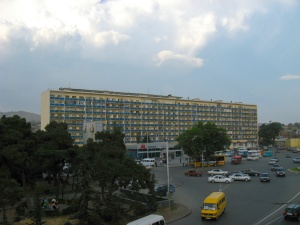
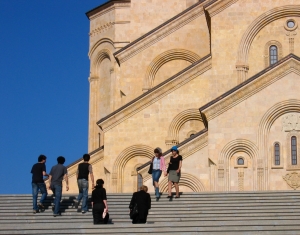
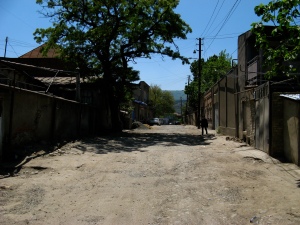
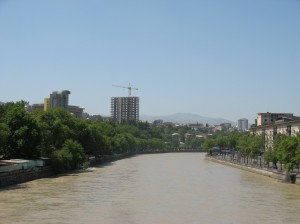
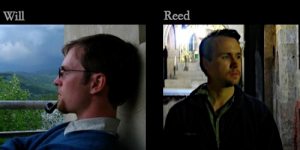
Nice! I feel like I was there.
Hi Reed,
Nice job on your website! Look forward to future updates!
With you, Robert